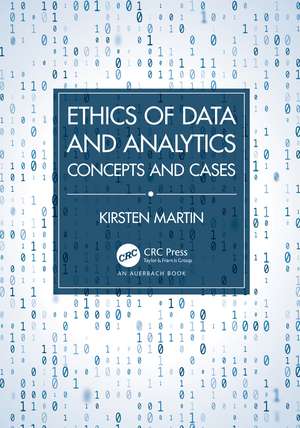Ethics of Data and Analytics: Concepts and Cases
Autor Kirsten Martinen Limba Engleză Hardback – 13 mai 2022
Ethics of Data and Analytics: Concepts and Cases does not search for a new, different answer or to ban all technology in favor of human decision-making. The text takes a more skeptical, ironic approach to current answers and concepts while identifying and having solidarity with others. Applying this to the endeavor to understand the ethics of data and analytics, the text emphasizes finding multiple ethical approaches as ways to engage with current problems to find better solutions rather than prioritizing one set of concepts or theories. The book works through cases to understand those marginalized by data analytics programs as well as those empowered by them.
Three themes run throughout the book. First, data analytics programs are value-laden in that technologies create moral consequences, reinforce or undercut ethical principles, and enable or diminish rights and dignity. This places an additional focus on the role of developers in their incorporation of values in the design of data analytics programs. Second, design is critical. In the majority of the cases examined, the purpose is to improve the design and development of data analytics programs. Third, data analytics, artificial intelligence, and machine learning are about power. The discussion of power—who has it, who gets to keep it, and who is marginalized—weaves throughout the chapters, theories, and cases. In discussing ethical frameworks, the text focuses on critical theories that question power structures and default assumptions and seek to emancipate the marginalized.
| Toate formatele și edițiile | Preț | Express |
|---|---|---|
| Paperback (1) | 408.90 lei 3-5 săpt. | +37.36 lei 4-10 zile |
| CRC Press – 13 mai 2022 | 408.90 lei 3-5 săpt. | +37.36 lei 4-10 zile |
| Hardback (1) | 1109.18 lei 6-8 săpt. | |
| CRC Press – 13 mai 2022 | 1109.18 lei 6-8 săpt. |
Preț: 1109.18 lei
Preț vechi: 1352.65 lei
-18% Nou
Puncte Express: 1664
Preț estimativ în valută:
212.28€ • 221.03$ • 179.40£
212.28€ • 221.03$ • 179.40£
Carte tipărită la comandă
Livrare economică 10-24 martie
Preluare comenzi: 021 569.72.76
Specificații
ISBN-13: 9781032217314
ISBN-10: 1032217316
Pagini: 492
Ilustrații: 80
Dimensiuni: 178 x 254 x 27 mm
Greutate: 0.45 kg
Ediția:1
Editura: CRC Press
Colecția Auerbach Publications
ISBN-10: 1032217316
Pagini: 492
Ilustrații: 80
Dimensiuni: 178 x 254 x 27 mm
Greutate: 0.45 kg
Ediția:1
Editura: CRC Press
Colecția Auerbach Publications
Public țintă
Postgraduate and Undergraduate AdvancedNotă biografică
Kirsten Martin is the William P. and Hazel B. White Center Professor of Technology Ethics at the University of Notre Dame’s Mendoza College of Business. A professor in the IT, Analytics, and Operations department but focus on the ethics of data and analytics, she has been teaching business ethics in a business school for 15 years and has experience writing and teaching on the ethics of data, analytics and privacy. Her research focuses on privacy, accountability, technology, algorithms, and ethics Martin is the editor of the "Technology and Business Ethics" section in the Journal of Business Ethics. She is the coauthor of a recent book on business ethics for the popular press (The Power of And) and has a popular Ted talk on privacy and data. She holds Ph.D. and MBA degrees from the University of Virginia’s Darden School of Business and a B.S. Engineering is from the University of Michigan.
Cuprins
Introduction. 1 Value-Laden Biases in Data Analytics. 2 Ethical Theories and Data Analytics. 3 Privacy, Data, and Shared Responsibility. 4 Surveillance and Power. 5 The Purpose of the Corporation and Data Analytics. 6 Fairness and Justice in Data Analytics. 7 Discrimination and Data Analytics. 8 Creating Outcomes and Accuracy in Data Analytics. 9 Gamification, Manipulation, and Data Analytics. 10 Transparency and Accountability in Data Analytics. 11 Ethics, AI, Research, and Corporations. Index.
Descriere
This textbook provides faculty the major concepts and cases to include in a class on the ethics of data analytics. The book is distinct as it focuses on ethics of data analytics, AI, and data (rather than infrastructure and reliability) and by explicitly linking data analytics to foundational business ethics theory.
